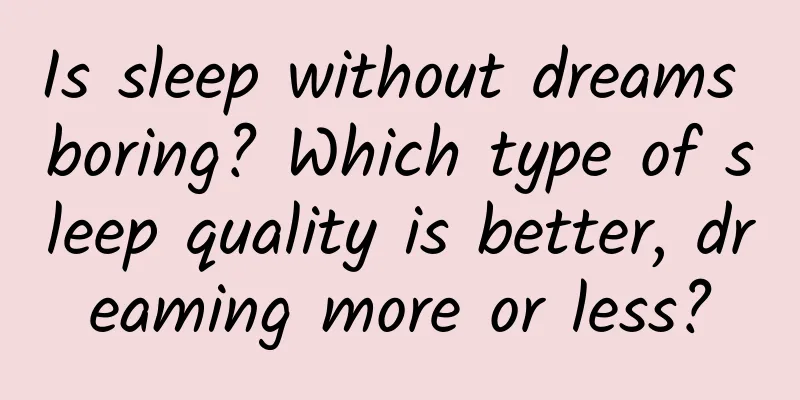Is sleep without dreams boring? Which type of sleep quality is better, dreaming more or less?

|
People often ask Oh, I dream too much at night. Is there something wrong with your body? But someone asked I seem to dream very little Is there something wrong with this? Don't panic yet Let me give you the answer today Dreaming itself is a normal physiological phenomenon of sleep. On average, most people dream for about 2 hours each night , and while dreams can occur during any stage of sleep, dreams are the richest and most vivid during the rapid eye movement (REM) stage. You may have this feeling: before waking up in the morning, you often feel like you have been dreaming. This is because, in the second half of the night (including the time when you wake up near the early morning), REM sleep accounts for a larger proportion and there are more opportunities to dream. Image source: Photo Network Based on the population data currently surveyed by scientists, the conclusion that can be drawn is that dreaming itself is a normal physiological phenomenon. Scientists used polysomnography to monitor sleep outcomes and stages and found that: Dreaming alone does not affect sleep (nor does it affect sleep structure), but nightmares are an exception. Note that medicine has a stricter definition of nightmares, which refers to a nightmare that wakes you up from sleep. Image source: Photo Network Nightmares can affect sleep because they interrupt sleep and often make it difficult for people to fall asleep. However, dreams that are very nervous and scary but do not wake you up are called "nervous dreams." Nervous dreams are normal and usually benign. When it comes to nightmares that affect sleep, you may be a little worried: I have had this kind of nightmare; my children have had nightmares; is this a big deal? Image source: Photo Network AI In fact, it is normal for children and adults to have nightmares occasionally. Although it will affect sleep and daytime state at night, as long as it is not frequent, there is no need to worry. However, if you experience any of the following, you should see a doctor: ●Nightmares occur more than once a week. ●Nightmares interfere with your sleep, mood, and/or daily activities. ●The nightmares began at the same time you started taking a new medication. You should know that frequent nightmares will cause lack of sleep, and will cause anxiety, fear of sleep, and active reduction of sleep. Sleep deprivation will cause the rapid eye movement period during sleep to rebound (become more), which in turn leads to more nightmares, entering a vicious cycle. Therefore, at this time, don't resist, it is recommended to see a specialist. There are two purposes: 1. Evaluate the underlying causes of frequent nightmares; some causes are treatable. 2. Treat the symptom of nightmares itself, reduce the frequency of nightmares, and reduce the impact on life. Then why do many people feel that they have many dreams, did not sleep well, and are not in good condition during the day? At this time, you need to put aside the dream problem first, and start looking for the cause directly from **"poor sleep and bad daytime state"**, such as: The sleeping environment has changed; I feel unwell; Recent mood changes (e.g., anxiety, depression); Recently taken certain medications (including health supplements, Chinese herbal medicines); and having some specific sleep disorder. In short, dreaming is a normal phenomenon during sleep and is a manifestation of brain activity in certain stages of sleep. Everyone goes through multiple sleep cycles each night, and most people have multiple dreams throughout a night's sleep, but not all dreams are remembered. However, if you often have nightmares (the kind that wakes you up in fright), or if even if it is not a nightmare but you feel that your daytime state is significantly affected, it is recommended that you seek professional help. Statement: This article is a medical-related educational popular science article. It does not involve specific treatment methods or medical behaviors and cannot replace hospital visits. Content Production Source: Popular Science China "Dreaming frequently vs. dreaming rarely, who has better sleep quality? The answer is actually... " Author: Yu Zhouwei Editor: Zhang Fuyao Map: Eastern Zhou Dynasty |
<<: Remember to look up recently! This life-threatening journey is about to begin
>>: The poultry industry's 'secret weapon': What exactly is sexing chicks?
Recommend
Review of JD.com’s Double 11 Operation: How to Carry Out JD.com’s Flagship Marketing Activities
Described from the perspectives of traffic distri...
Why can't you remember things? Science shows: forgetting is also a kind of learning!
"Forget, forget, forget all, the troubles of...
Really lengthened. Spy photos of the domestically produced new Audi Q5 body in white
Earlier media reports said that the new FAW-Volks...
Offline traffic generation skills, a set of effective solutions!
As an offline merchant, what methods have you tri...
Feng Qingyang Excel full set of 300 tutorials
Tutorial Introduction ├─Part 1: Basics│ 1.1 To le...
How to carry out operational promotion activities for the purpose of attracting new customers?
This article will share with you my thoughts on a...
Meng Ge Resume: How can a novice with no basic knowledge learn SEO optimization?
We all know that SEO is the basis of online marke...
Is the mathematical foundation of deep neural networks too difficult for you?
Deep Feedforward Network We start from statistics...
Rocket launches fail for different reasons
In 2022, there were 186 orbital launches worldwid...
Tesla: Tesla's annual sales in 2024 will be 1.79 million vehicles, a year-on-year decrease of 1.1%
Tesla recently released its full-year delivery da...
Case Analysis|Review of Himalaya FM's "66 Membership Day" event
1. Activity Background 1. Market conditions Pay a...
The reason why iOS with 1GB RAM can beat Android with massive RAM
A user on Quora explained that the Android system...
How much do you know about Android AOP?
picture Introduction to AOP AOP (Aspect-Oriented ...
Performance-squeezing games castration: From "Until Dawn" to the current state of PS4 games
Compared to the remastered games for Microsoft XB...
B2B community operation skills!
Most B2Bs are either still struggling with whethe...









